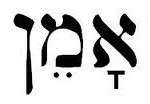Let us say Amen
 The Encyclopaedia Brittanica calls Amen “perhaps the most widely known word in human speech”.
The Encyclopaedia Brittanica calls Amen “perhaps the most widely known word in human speech”.
From its first occurrence in Num. 5.22 when the Priest addresses a suspected adulteress and she responds “Amen, Amen”, the word appears in Hebrew Scripture 30 times.
Usually it endorses a serious statement, as in Deut. 27 when the Levites list twelve transgressions such as “Cursed is he who removes his neighbour’s landmark”. And all the people respond: “Amen”, i.e “Yes”, or “So be it.”
In the Temple in Jerusalem it was a liturgical response, particularly to the Levites’ Songs (Psalm 41:14 , Neh.8.6 Chron. 16.36), but whether it was used daily is not certain.
With the rise of the synagogue during the Second Temple period, Amen became a common response, especially to benedictions. There was a huge synagogue in Alexandria where the congregation could not hear the prayers clearly and a signaler waved a flag so that the worshippers would know when to say Amen (Sukkah 51b).
In subsequent synagogue usage, the officiant indicated when Amen should be said, e.g. each section of the Kaddish ends with “say Amen” (“V’imru Amen”).
The root meaning of the word is to confirm or support. It is in connection with Ex. 17:12 which states that during the war with the Amalekites, Moses’ hands – uplifted to maintain the people’s morale – were emunah, firm until the going down of the sun.
From denoting firmness the word came to indicate affirmation or belief. Hence, after a benediction formula Amen says “I identify with this praise of God”.
Rabbinic literature acclaims those who say Amen, e.g. “Whoever responds Amen with all their energy, a gate in Paradise is opened for them” (Shabbat 119b) God Himself is said to nod Amen when man utters His praise (B’rachot 7a).
Looked at homiletically, the liturgical rules applying to Amen offer a lesson for life.
When I hear a benediction I have to say Amen. I dare not remain unmoved and unresponsive as if I had ears but did not hear (Psalm 115:6).
I do not say Amen after my own prayer. I ought not be too sure of myself.
I do not say an abbreviated Amen. My response should be wholehearted and complete.
I do not say a hurried Amen. I am not in a hurry to agree before I hear all the facts.
I do not say an orphan Amen. An Amen that comes too late loses its value. I try to say the right Amen at the right moment.
Albert Camus said “If we believe in nothing, then nothing has any meaning”. Amen allows us to believe and to say so.



